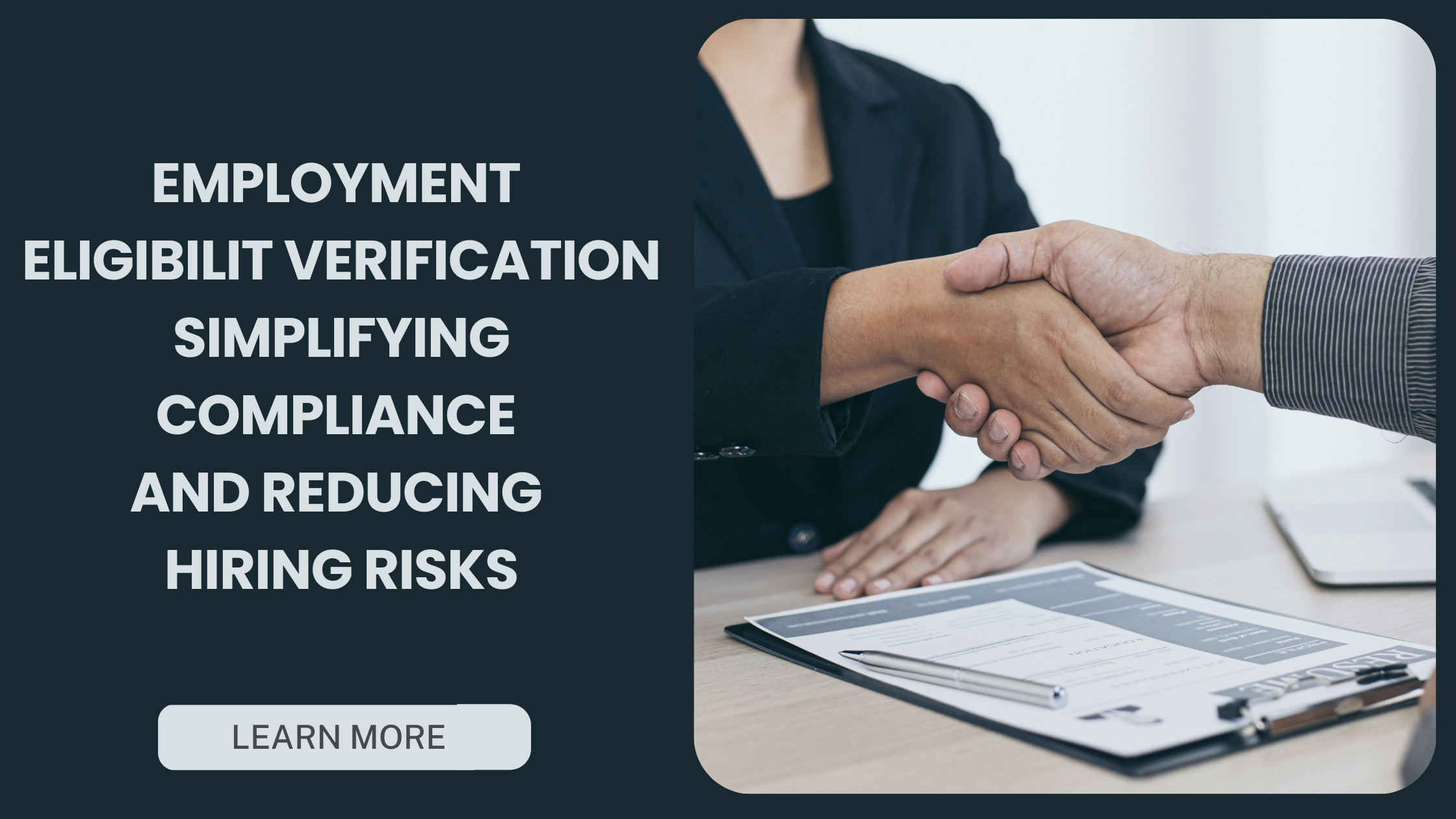Understanding Employment Eligibility Verification
Employment eligibility verification is a critical process that ensures businesses hire only legally authorized individuals, helping to maintain a lawful and compliant workforce. At the heart of this process lies confirming that each employee is eligible to work in the United States. This is crucial for both employers and employees, as non-compliance with employment eligibility laws can lead to significant legal and financial penalties.
The most common verification tools used to assess employment eligibility include I-9 verification, the E-Verify system, and immigration status checks. These tools serve as safeguards to prevent the hiring of individuals who do not have the legal right to work in the country, ensuring that businesses comply with immigration regulations.
I-9 Verification and E-Verify: Key Tools for Employment Eligibility
- I-9 Verification: The Form I-9 is a document that all employers are required to complete for every new hire. It includes verifying the identity of employees and their eligibility to work in the U.S. Employers must retain these forms for a specified period and be prepared to present them for inspection if requested by the government.
- E-Verify: E-Verify is an online system provided by the U.S. Department of Homeland Security (DHS) and the Social Security Administration (SSA) that allows employers to electronically verify the employment eligibility of their employees. Unlike I-9, which is manual, E-Verify provides instant results, reducing the likelihood of human error and speeding up the verification process.
Why Employment Eligibility Verification Matters
Compliance with employment eligibility laws is vital for businesses. Employers that fail to properly verify the work eligibility of their hires risk facing severe penalties under federal law. These penalties may include fines, civil charges, or even criminal prosecution in extreme cases. Beyond legal ramifications, hiring employees without verifying their eligibility can damage a company’s reputation and expose it to liability.
Furthermore, employers are responsible for maintaining accurate records. With manual processes, mistakes such as incomplete forms or incorrect information can happen, leading to the risk of non-compliance. This is where automated systems like E-Verify can help streamline the process, ensuring quicker, more accurate results.
Risks of Non-Compliance
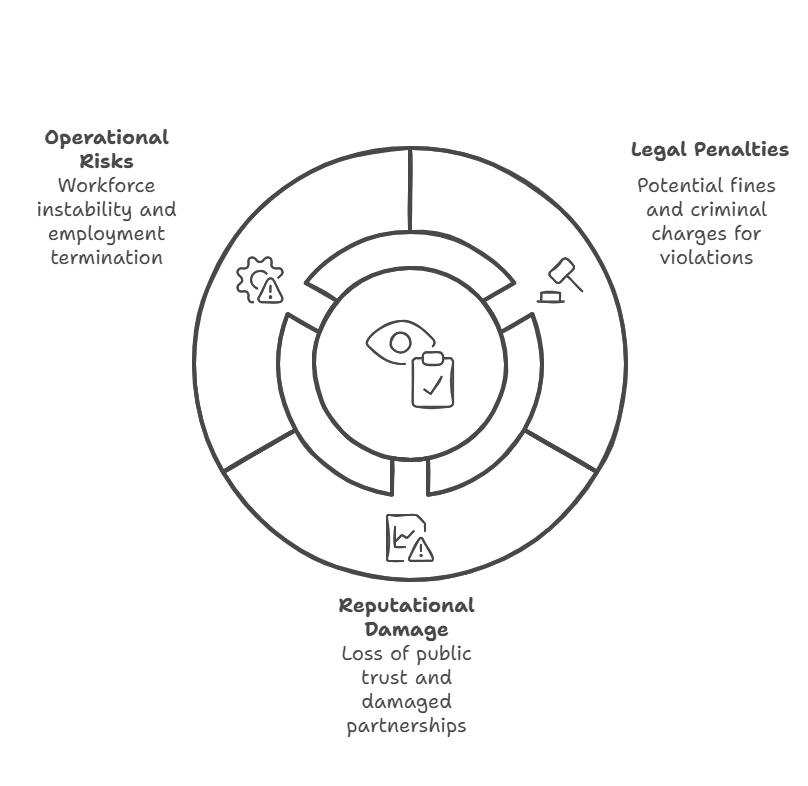
Non-compliance with employment eligibility verification requirements can lead to the following risks:
- Legal Penalties: Employers found violating the Immigration Reform and Control Act of 1986 (IRCA) could face fines ranging from hundreds to thousands of dollars per violation. Repeated violations could escalate to criminal charges.
- Reputational Damage: Failing to properly verify employee eligibility can damage a company’s reputation, leading to loss of public trust and potential client or partner relationships.
- Operational Risks: Hiring individuals who are not legally eligible to work can create workforce instability, especially if their employment is later terminated due to non-compliance.
Traditional vs. Automated Employment Eligibility Verification
Traditional methods of employment eligibility verification are typically more time-consuming and error-prone. They often involve manually completing and storing I-9 forms and tracking verification information manually, which can lead to inconsistencies and human error. In contrast, automated systems such as E-Verify provide an instant, reliable way to verify employment eligibility and help businesses stay compliant.
| Verification Method | Speed | Accuracy | Risk of Errors | Compliance |
|---|---|---|---|---|
| Manual I-9 Checks | Slow | Prone to Errors | High | Moderate |
| Automated E-Verify Checks | Fast (Instant) | High Accuracy | Low | High |
This table highlights key differences between traditional manual checks and automated systems like E-Verify. As businesses look to streamline their hiring processes, adopting automated solutions like E-Verify can significantly reduce the time spent on verification while improving accuracy and compliance.
The Role of Employment Eligibility Verification Services
Employment eligibility verification services are essential for businesses to ensure compliance with federal laws and avoid potential legal issues. These services typically verify the authenticity of documents such as I-9 forms and confirm eligibility through systems like E-Verify. By choosing the right service provider, companies can save time, reduce risks, and streamline their hiring process. In this section, we compare the offerings of RapidHireSolutions with those of other employment eligibility verification providers.
Why Choose RapidHireSolutions?
RapidHireSolutions stands out for its commitment to accuracy, speed, and full compliance with legal requirements. Unlike competitors who may have slower turnaround times, higher error rates, and limited customer support, RapidHireSolutions ensures an efficient, hassle-free experience for employers.
Comparison Table: RapidHireSolutions vs. Competitors
| Metric | RapidHireSolutions | Competitors |
|---|---|---|
| Turnaround Time | ✅ 24 Hours | ❌ 15-20 Days |
| Verification Accuracy | ✅ 99% | ❌ 35% |
| Cost-Effectiveness | ✅ Competitive Pricing | ❌ High Costs |
| Compliance with Regulations | ✅ Fully Compliant | ❌ May Not Be Fully Compliant |
| Customer Support | ✅ 24/7 Availability | ❌ Limited Hours |
As illustrated in the table, RapidHireSolutions offers several key advantages over competitors. The company’s commitment to delivering fast, accurate, and compliant services positions it as a reliable choice for businesses looking to streamline their employment eligibility verification processes. Competitors, on the other hand, often fall short in terms of turnaround time, accuracy, and overall customer support.
Let’s Dive Into a Proper Analysis
To further understand the strengths of RapidHireSolutions, let’s break down the key advantages of our services and compare them to the drawbacks of competitors.
Advantages of RapidHireSolutions
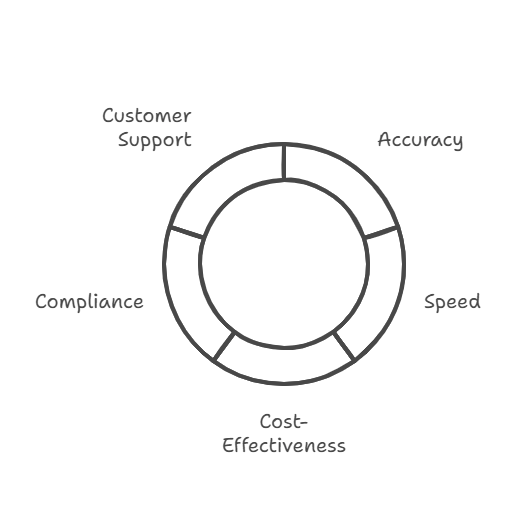
- Accuracy: One of the standout features of RapidHireSolutions is its impressive accuracy rate of 99%. This high level of accuracy ensures that employers are verifying their employees’ eligibility correctly, avoiding any risks associated with misreporting or errors that could lead to legal trouble.
- Speed: The fast turnaround time of just 24 hours is another advantage of RapidHireSolutions. While competitors may take 15-20 days to process employment eligibility verifications, RapidHireSolutions allows employers to quickly onboard new hires without unnecessary delays.
- Cost-Effectiveness: RapidHireSolutions offers competitive pricing for its employment eligibility verification services. Many competitors, on the other hand, charge higher rates that may not justify the level of service provided. RapidHireSolutions provides cost-effective solutions that are tailored to meet the needs of businesses of all sizes.
- Compliance: Ensuring full compliance with federal, state, and local regulations is a top priority at RapidHireSolutions. Employers can trust that their verification process meets the stringent requirements of the Immigration Reform and Control Act (IRCA) and other relevant laws, reducing the risk of penalties for non-compliance.
- Customer Support: RapidHireSolutions stands out for its superior customer support. Unlike competitors who may offer limited customer service hours or insufficient assistance, RapidHireSolutions provides 24/7 support, ensuring employers can get help whenever they need it.
Drawbacks of Competitors
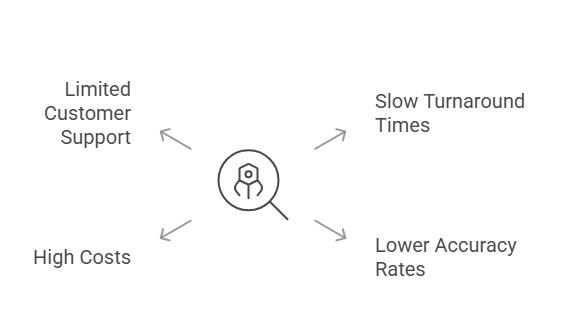
- Slow Turnaround Times: As previously mentioned, many competitors have slower turnaround times, ranging from 15 to 20 days. This delay can impact businesses’ ability to hire quickly, particularly in industries where fast recruitment is critical.
- Lower Accuracy Rates: Some competitors may have accuracy rates as low as 85%, which can lead to errors in the verification process. This creates unnecessary risks for employers, potentially causing compliance issues that could result in fines or legal consequences.
- High Costs: While competitors may offer verification services, the high costs often make them less attractive for businesses looking to maintain a streamlined hiring process. RapidHireSolutions, on the other hand, provides high-quality services at a competitive price.
- Limited Customer Support: Customer support is a crucial element of any service, and many competitors fall short in this area. Limited availability of customer support hours can be frustrating for businesses that need timely assistance. RapidHireSolutions offers 24/7 support, ensuring businesses have the help they need when they need it.
Why RapidHireSolutions is the Better Option
- Streamlined Process and Faster Results: With a focus on efficiency, RapidHireSolutions ensures that businesses can complete employment eligibility verification in just 24 hours. This speed helps employers avoid unnecessary delays, keeping the hiring process moving smoothly.
- Accurate and Reliable Compliance: RapidHireSolutions guarantees accuracy and compliance with all relevant laws. The service is designed to reduce the risk of errors that could result in legal penalties, helping businesses maintain their reputation and avoid costly fines.
- Customer-Centric Approach: RapidHireSolutions provides dedicated customer support that helps businesses navigate the complexities of employment eligibility verification. With a team ready to assist around the clock, employers can always rely on RapidHireSolutions for help.
RapidHireSolutions offers a faster, more accurate, and more cost-effective alternative to competitors. Its dedication to compliance, speed, and customer support makes it the top choice for businesses looking to streamline their employment eligibility verification processes and reduce hiring risks.
Legal Considerations of Employment Eligibility Verification
Employment eligibility verification is a crucial process for businesses to ensure compliance with federal, state, and local laws. The most prominent regulations that businesses must adhere to are the Immigration Reform and Control Act (IRCA) of 1986, the I-9 Form requirements, and the E-Verify system. These regulations set the standards for verifying that employees are legally authorized to work in the United States. Non-compliance can lead to significant penalties, reputational damage, and operational disruptions.
Key Regulations and Compliance
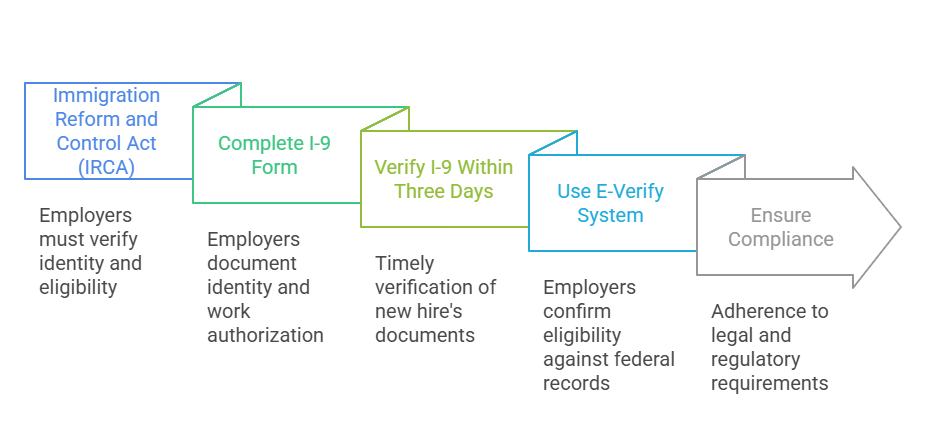
- Immigration Reform and Control Act (IRCA) of 1986: Under the IRCA, employers are required to verify the identity and employment eligibility of all new hires, regardless of nationality or citizenship status. Failure to comply with these requirements can result in substantial fines and even criminal charges in extreme cases.
- I-9 Form: Employers must complete and retain an I-9 form for each new hire, which records the employee’s identity and authorization to work. This form must be verified within three days of the employee’s start date. Non-compliance with the I-9 requirements can lead to civil fines.
- E-Verify: This online system is operated by the U.S. Department of Homeland Security (DHS) and the Social Security Administration (SSA). It allows employers to confirm the employment eligibility of their new hires by comparing the information provided on the I-9 form with federal records. Employers must use E-Verify in certain cases, such as federal contractors or in states with mandatory E-Verify laws. The system helps reduce errors and ensures faster, more accurate verifications.
Risks of Non-Compliance
Failure to properly verify employment eligibility exposes businesses to legal, financial, and reputational risks:
- Legal Penalties: Employers found violating I-9 requirements or failing to use E-Verify could face fines, which escalate for repeated offenses. Penalties can range from a few hundred dollars for first-time violations to thousands of dollars for subsequent violations.
- Reputational Damage: Inaccurate or incomplete employment eligibility verification can result in negative publicity, harming an organization’s reputation. Customers and potential employees may lose trust in a business that does not comply with regulations.
- Audit Risks: Employers who do not maintain proper records or comply with verification laws may be subject to audits by Immigration and Customs Enforcement (ICE), which can be time-consuming and costly.
Frequently Asked Questions (FAQs)
What is the difference between E-Verify and I-9 verification?
E-Verify is an electronic system that allows employers to verify an employee’s eligibility to work by comparing the information from the I-9 form with federal databases. While the I-9 form is required for all new hires, using E-Verify is voluntary for most employers, although some states and federal contractors mandate its use. The key difference is that E-Verify provides real-time verification, reducing the risk of errors associated with manual checks.
How long does it take to verify employment eligibility?
Verification can be done quickly, especially when using automated systems like E-Verify. In most cases, the E-Verify process takes just a few seconds to complete. However, some verifications may require additional documentation or follow-up, which can extend the timeline. For manual methods, the process can take days or even weeks, depending on the employer's internal processes and the verification methods used.
What happens if an employee’s eligibility status is not verified?
If an employee’s eligibility status is not verified, the employer may be in violation of federal laws, and the employee cannot legally work for the company. Employers are required to suspend the hiring process until eligibility is confirmed. If an employee is allowed to work without proper verification, the employer could face fines and legal consequences.
Can an employer use third-party services for employment eligibility verification?
Yes, employers can use third-party services like RapidHireSolutions to handle employment eligibility verification. Third-party services offer the advantage of expertise, faster processing times, and reduced errors. They also ensure compliance with the latest regulations, providing businesses with peace of mind.
How does RapidHireSolutions ensure compliance with verification regulations?
RapidHireSolutions ensures compliance by staying up-to-date with federal, state, and local regulations governing employment eligibility. The company uses the latest technology, such as E-Verify, to provide fast and accurate verification results. Additionally, RapidHireSolutions’ team of experts ensures that all verification steps are completed according to the law, helping businesses avoid penalties and maintain a compliant workforce.
Conclusion
RapidHireSolutions provides businesses with the tools to streamline the employment eligibility verification process while ensuring full compliance with all applicable laws and regulations. By offering fast, accurate, and cost-effective verification solutions, RapidHireSolutions helps employers mitigate the risks associated with hiring non-compliant workers, reducing the potential for legal penalties and reputational damage. The importance of verifying employment eligibility cannot be overstated—by partnering with a reliable verification service, companies can ensure they are hiring qualified, legally authorized individuals, while maintaining smooth operations and compliance.
In summary, using a third-party service like RapidHireSolutions to manage employment eligibility verification simplifies the hiring process, reduces risks, and guarantees compliance. Businesses that prioritize verification and compliance will safeguard their workforce and reputation, leading to a stronger and more sustainable business model.

